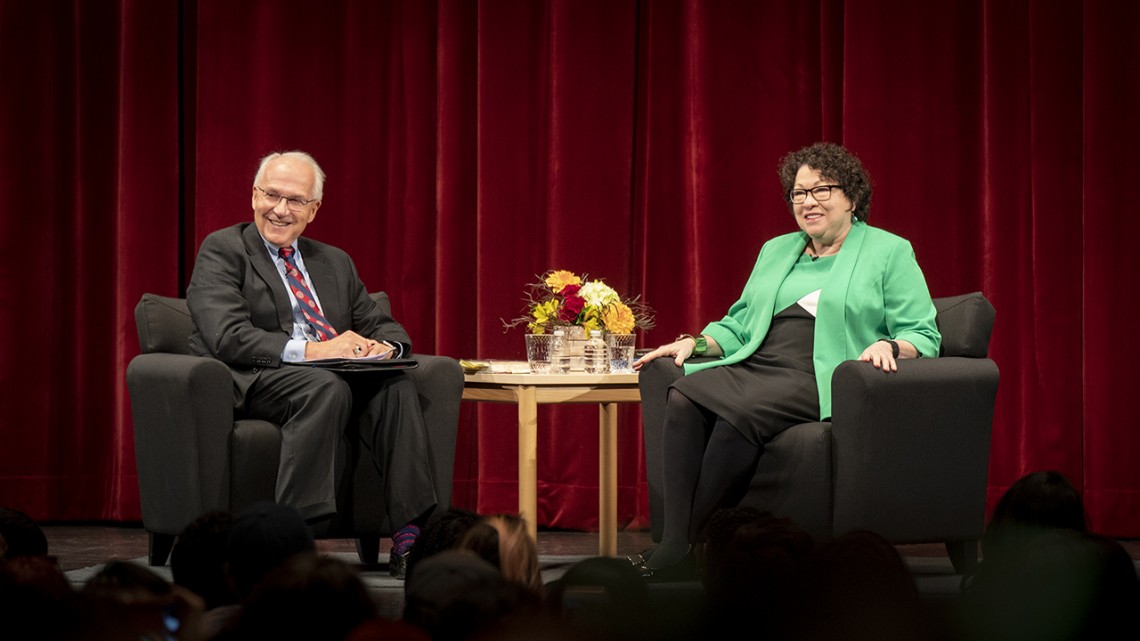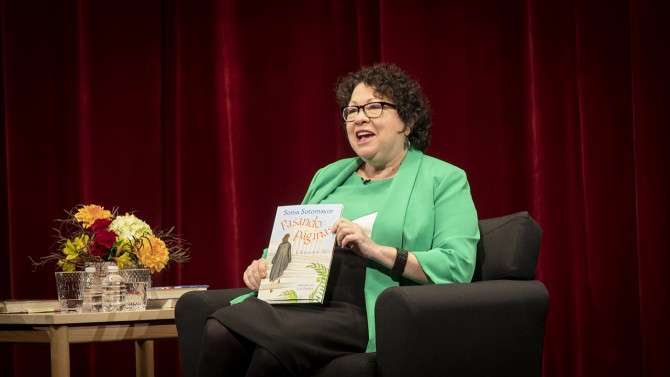
Judge Richard C. Wesley, J.D. ’74, U.S. Court of Appeals for the Second Circuit, left, speaks with U.S. Supreme Court Associate Justice Sonia Sotomayor Oct. 18 in Bailey Hall.
‘Be a voice for change,’ Sotomayor tells Cornellians
By Melanie Lefkowitz
Success did not come easy to Sonia Sotomayor. She knows how much pain there is in life. But hard work, a determination to fight for her beliefs and an “innate optimism” helped propel her from a childhood in a Bronx housing project to her role as associate justice of the U.S. Supreme Court, Sotomayor told nearly 1,200 students, faculty, staff and guests in a highly personal talk Oct. 18 in Bailey Hall.
Described as a “fireside chat,” Sotomayor’s easygoing conversation with her longtime friend Judge Richard C. Wesley, J.D. ’74, U.S. Court of Appeals for the Second Circuit, ranged from her diagnosis with diabetes at age 7 to her earliest impressions as a first-generation student at Princeton University; from how she found refuge in the public library after her father’s death to her fears that she would lose herself once she ascended to the Supreme Court.
“I’m a firm believer that adversity and failure are things you want to have,” she said. “Those things help you grow, and inevitably they help you grow in positive ways. It’s when you let them define you that they become negative, and that’s something I would never permit those things to do. Sonia is Sonia not because of them, but with them.”
Sotomayor, who was appointed to the Supreme Court by President Barack Obama in 2009, is the first person of Hispanic heritage and the third woman to serve on the nation’s highest court. After attending Princeton and Yale Law School, she worked as an assistant district attorney for New York County and a lawyer in private practice. She served as a federal trial court judge – the only sitting Supreme Court justice to have done so – before her appointment to the Second Circuit, where she and Wesley worked together for six years.
Her interest in the law began with Nancy Drew and Perry Mason. It evolved as she began to appreciate the importance of how laws “define our relationships as a community,” as well as situations in which unfair laws or laws with unintended consequences need to be changed.
“That’s how we grow as a society,” she said. “I wanted to be a part of that. I wanted to be a voice in those positive changes, and I’m here today, and I speak publicly, because I’m trying to engage every student in this room to remember that your most important job in life as a member of this community is to be involved in bettering it. To be a voice for change. To take action when you see things you don’t like. To be civically involved in making this a better union.”
In his introduction, Eduardo Peñalver ’94, the Allan R. Tessler Dean of Cornell Law School, referred to what he called the “pseudo-controversy” in 2009 over Sotomayor’s suggestion that she provides an important judicial perspective as a “wise Latina.”
“To my mind, the distinctive voice that Justice Sotomayor has brought to her work at the Supreme Court has more than vindicated her claim,” Peñalver said. “She brings to it the distinctive wisdom of a former district attorney, the distinctive wisdom of a former trial court judge, and yes, the distinctive wisdom of a Latina from the Bronx.”
At Bailey, Sotomayor also discussed the challenges of getting used to fame and the many opportunities she has for socializing with her fellow justices – though she said she does not share her colleagues’ love of opera, preferring jazz. She said her hobbies include reading, cooking and getting together with friends, who she has urged to hit her over the head with her own memoir if she gets “conceited.”
She said she wrote her memoir, “My Beloved World,” as well as a children’s book, “Turning Pages: My Life Story,” in part to stay connected with her own past.
“I loved my life, I loved New York, I loved everything that I had grown up with, and I was afraid in this new world I would lose it,” she said. “I started to realize that I had to hold on to who I was, and for me the process to do that was writing that book.”
She discussed her diabetes, which has been an important part of her life and perhaps even part of her success. “It doesn’t define me, but it certainly does give me powers, strengths, that other people don’t have,” she said.
During the talk, Sotomayor roamed the audience, shaking hands and posing for pictures as she answered pre-submitted questions from law students. The first question, her favorite Bronx-style pizza in New York, was easy: Joe’s Pizza on Bleecker Street. Another student asked for her advice for young female attorneys and law students during this “time of national reckoning,” when many women feel like they’re not being heard.
“Anything you do in life requires hard work, and anything that’s worth getting requires even harder work, and you can’t take disappointment and despair and let it control you,” Sotomayor said. “We have only one option in this world, and that’s to keep on trying. People have died for our freedoms. How many civil rights leaders gave their lives so that we could have voices we have today? If they can give their lives, we can expend our energy in making their dream come true.”
The Bailey Hall talk was presented by the Cornell Law School and the Office of the President.
Media Contact
Get Cornell news delivered right to your inbox.
Subscribe

